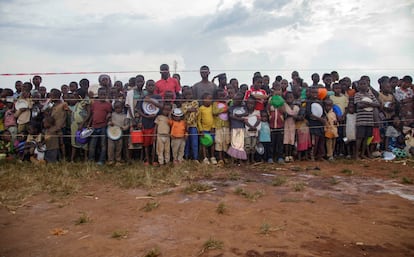UN’s global refugee resettlement program crumbles after US withdrawal
As the Trump administration pulls back, UNHCR is calling on other nations to protect the world’s most vulnerable

Among the first wave of the hundreds of executive orders signed by Donald Trump during his second U.S. presidential term was the suspension of the country’s Refugee Admissions Program. The decree dealt a fatal blow to the United Nations resettlement program, as the United States had previously been the country that accepted the largest number of its beneficiaries: 69% of the total in 2024.
The measure was blocked one month later by a federal judge, on the grounds that the decision exceeded the administration’s powers. Though this was followed by other court orders, but in practice, the U.S. State Department has proceeded to terminate contracts with the main national organizations that were implementing the program. Both the indefinite ban on accepting refugees and the freeze on funding remain in place, despite appeals from the resettlement organizations.
On Monday, the Ninth Circuit Court of Appeals, which has already blocked other anti-immigration measures taken by Trump, issued another ruling, stating that the administration must resettle thousands of refugees who already had flights scheduled to the United States before January 20, when Trump took office, and that were canceled due to the executive order. Previously, the government had stated that it would only resettle 65 Afghan refugees in coming months.
Resettlement is a little-known but essential tool for the most vulnerable asylum seekers and refugees. It involves transferring individuals from a country where they have already sought protection to a third country that grants them permanent or long-term residence. This program is aimed at people in urgent need of protection — such as survivors of violence or torture, women and children at risk, and others with serious physical or legal protection needs.
More than 50% of resettlement beneficiaries are women and girls, as they often face serious risks in host countries where they typically live in refugee camps, explains Haruno Nakashiba, senior coordinator for resettlement and complementary pathways at the U.N. Refugee Agency (UNHCR). “For them, it can be a life-saving solution and their only chance to rebuild a future safely,” she said in an email.
The program’s beneficiaries are initially identified and selected by UNHCR, although the final decision is made at the discretion of the host country. In 2024, 116,528 individuals were resettled around the world. Of them, around 80,000 (69%) were admitted to the United States. The rest went primarily to Canada, Australia, Germany and other European countries and the Asia-Pacific region.
The decision worsens an already troubling situation that predated Trump’s time in the White House. The 116,528 refugees who were resettled last year represent just a fraction of the 2.4 million in urgent need of relocation.
With the U.S. pulling back, that number is expected to drop even further. And 2025 doesn’t look any more promising: UNHCR estimates that 2.9 million people will need resettlement — 500,000 more than the previous year, a 20% increase. The rise is due to the persistence of mass displacement crises like the war in Syria — where, despite the fall of Bashar al-Assad’s regime in December, 6.2 million Syrians still live as refugees outside the country.
New conflicts, such as in the Democratic Republic of Congo, and climate-related disasters like floods, earthquakes, and droughts have also fueled the surge; in 2024 alone, 6.6 million people were displaced by such events, according to the Internal Displacement Monitoring Center (IDMC).
In light of this new scenario, with the resettlement program in dire straits, UNHCR is urging states to step up efforts to ensure that those who are most in need have access to resettlement.
“Every resettlement counts and must be valued, as it can help save a life. Even a relatively small quota is an important gesture of solidarity and is valued by refugee host countries,” said Nakashiba.
Consequences in the United States
The United States founded its resettlement program in 1980 when Congress unanimously approved the Refugee Act. That’s why, in a ruling issued at the end of February, federal Judge Jamal Whitehead in Seattle argued that Trump could not suspend its operations, as doing so amounted to an “effective nullification of congressional will.” “The president has substantial discretion [...] to suspend refugee admissions. But that authority is not limitless,” said Whitehead in a hearing, according to the Associated Press.
Since 1980, the United States has accepted more than three million refugees. Going forward, that will change. The decision’s impacts are already becoming noticeable. “More than 30,000 refugees who arrived in the U.S. in the months leading up to the Trump administration have lost access to essential services. Tens of thousands more remain in limbo overseas, including 1,600 Afghan allies who had been approved by DHS but had their flights canceled at the last minute,” said Refuge Point, of the country’s leading resettlement organizations.
The new administration has said that the reasoning behind the executive order is that the country has become “inundated” by resettlement requests. “The United States lacks the ability to absorb large numbers of migrants, and in particular, refugees, into its communities in a manner that does not compromise the availability of resources for Americans,” reads the text of the executive order. The United States is the country with the highest number of foreign-born residents, with 47.8 million documented migrants. Another 14 million are undocumented. But in the case of refugees, these “large numbers” (the three million received by the country since the 1980 law was passed) make up 0.88% of the country’s 340 million residents.
Contrary to the reasons given by the White House, a study published last year by the U.S. Department of Health and Human Services concluded that, over the course of 15 years, refugees and asylum seekers contributed $123.8 billion more to the country’s economy than they received in services.
Sign up for our weekly newsletter to get more English-language news coverage from EL PAÍS USA Edition
Tu suscripción se está usando en otro dispositivo
¿Quieres añadir otro usuario a tu suscripción?
Si continúas leyendo en este dispositivo, no se podrá leer en el otro.
FlechaTu suscripción se está usando en otro dispositivo y solo puedes acceder a EL PAÍS desde un dispositivo a la vez.
Si quieres compartir tu cuenta, cambia tu suscripción a la modalidad Premium, así podrás añadir otro usuario. Cada uno accederá con su propia cuenta de email, lo que os permitirá personalizar vuestra experiencia en EL PAÍS.
¿Tienes una suscripción de empresa? Accede aquí para contratar más cuentas.
En el caso de no saber quién está usando tu cuenta, te recomendamos cambiar tu contraseña aquí.
Si decides continuar compartiendo tu cuenta, este mensaje se mostrará en tu dispositivo y en el de la otra persona que está usando tu cuenta de forma indefinida, afectando a tu experiencia de lectura. Puedes consultar aquí los términos y condiciones de la suscripción digital.









































